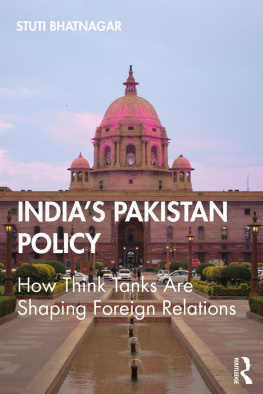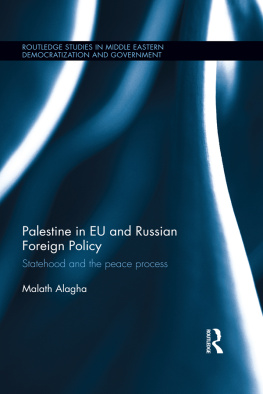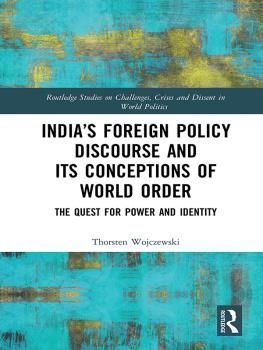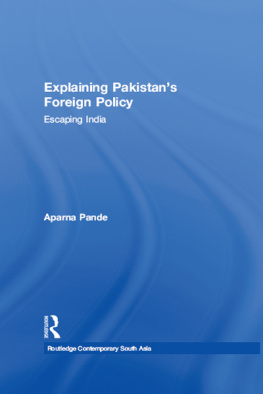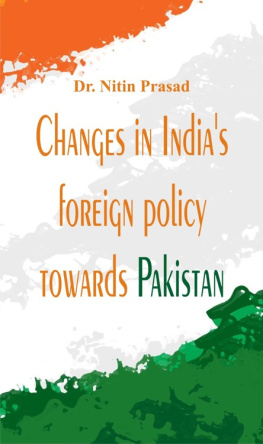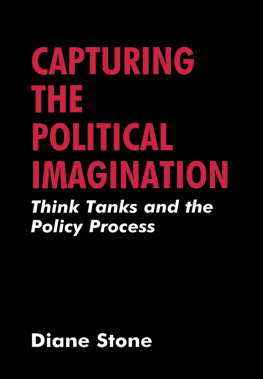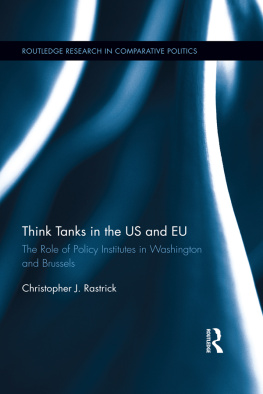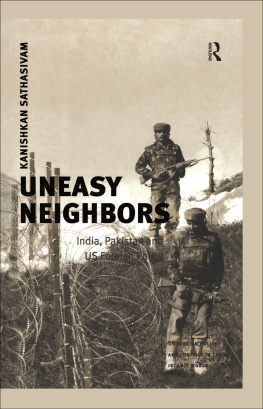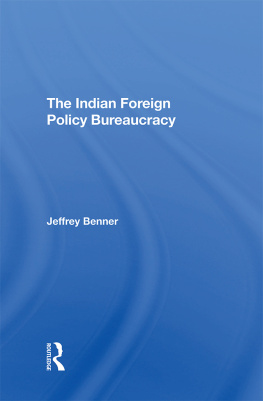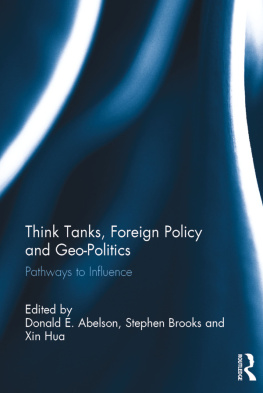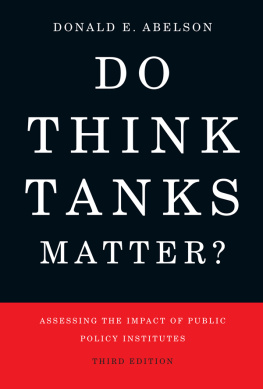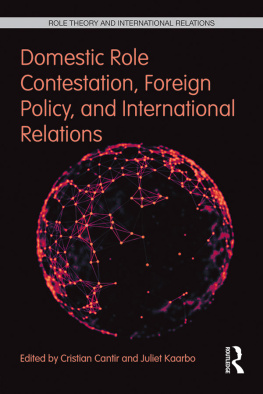INDIAS PAKISTAN POLICY
This book critically examines the role of think tanks as foreign policy actors. It looks at the origins and development of foreign policy think tanks in India and their changing relevance and position as agents within the policy-making process.
The book uses a comparative framework and explores the research discourse of prominent Indian think tanks, particularly on the IndiaPakistan dispute, and offers unique insights and perspectives on their research design and methodology. It draws attention to the policy discourse of think tanks during the Composite Dialogue peace process between India and Pakistan and the subsequent support from the government which further expanded their role. One of the first books to offer empirical analyses into the role of these organisations in India, this book highlights the relevance of and the crucial role that these institutions have played as non-state policy actors.
Insightful and topical, this book will be of interest to researchers focused on international relations, foreign policy analysis and South Asian politics. It would also be a good resource for students interested in a theoretical understanding of foreign policy institutions in general and Indian foreign policy in particular.
Stuti Bhatnagar is an adjunct fellow associated with the School of Social Sciences at the University of Adelaide and the University of New South Wales, Australia. With a PhD in politics and international relations from the University of Adelaide, she specialises in Indian foreign policy, especially the role and rising influence of think tanks in India. Additional research interests include the examination of political dynamics that drive IndiaPakistan relations and Indias changing foreign policy interests.
First published 2021
by Routledge
2 Park Square, Milton Park, Abingdon, Oxon OX14 4RN
and by Routledge
52 Vanderbilt Avenue, New York, NY 10017
Routledge is an imprint of the Taylor & Francis Group, an informa business
2021 Stuti Bhatnagar
The right of Stuti Bhatnagar to be identified as author of this work has been asserted by her in accordance with sections 77 and 78 of the Copyright, Designs and Patents Act 1988.
All rights reserved. No part of this book may be reprinted or reproduced or utilised in any form or by any electronic, mechanical, or other means, now known or hereafter invented, including photocopying and recording, or in any information storage or retrieval system, without permission in writing from the publishers.
Trademark notice: Product or corporate names may be trademarks or registered trademarks, and are used only for identification and explanation without intent to infringe.
British Library Cataloguing-in-Publication Data
A catalogue record for this book is available from the British Library
Library of Congress Cataloging-in-Publication Data
A catalog record for this book has been requested
ISBN: 978-0-367-33475-8 (hbk)
ISBN: 978-0-367-33476-5 (pbk)
ISBN: 978-0-429-32004-0 (ebk)
Typeset in Bembo
by Apex CoVantage, LLC
This book has its origins in a doctoral thesis written at the University of Adelaide. I would like to thank friends and colleagues at the School of Social Sciences at Adelaide for their support. My supervisors Dr. Priya Chacko and Prof. Timothy Doyle offered invaluable advice, input, assistance and encouragement. Their support made the process fulfilling. I also want to take this opportunity to thank Prof. Kanishka Jayasuriya (now at University of Murdoch) for taking time out to guide me on interview strategies and research design.
Additionally, I am grateful for the support that I have received from the staff and students at the Department of Politics and International Studies and the School of Social Sciences at the University of Adelaide. They have given me ample opportunities to gain experience, engage in intelligent conversation, and learn what it is to be part of the broader academic community. The thesis and the research visit to India would not have been possible without a travelling fellowship that enabled me to gather the resources and insights that added to the strength of my arguments.
I must also extend my heartfelt gratitude to my family and friends, especially to my husband Ashish and my daughter Aarzoo, who have endured my busy schedule and mood swings associated with PhD research and its subsequent revision for this book. Thanks also to my sister Madhur and my parents for all their encouragement despite the distance and to Zahid for all the guidance. I am also grateful for all the friends I have made these past few years in Australia, making the research and writing experience more enjoyable. I am grateful for you all, every single day.
This project began with a hope for peace between the people of India and Pakistan, and I hope the knowledge I have gained will help me further in this journey.
| AFSPA | Armed Forces Special Powers Act |
| AGPL | Actual Ground Position Line |
| AJK | Azad Jammu and Kashmir |
| APAO | Alternative Policy Advisory Organisations |
| APHC | All Parties Hurriyat Conference |
| ASEAN | Association of South East Asian Nations |
| BJP | Bharatiya Janata Party |
| BRICS | Brazil, Russia, India, China, South Africa |
| CAPS | Centre for Air Power Studies |
| CBM | Confidence-Building Measures |
| CD | Composite Dialogue |
| CDR | Centre for Dialogue and Reconciliation |
| CFR | Council on Foreign Relations |
| CLAWS | Centre for Land Warfare Studies |
| COSATT | Consortium of South Asian Think Tanks |
| CPR | Centre for Policy Research |
| CRPF | Central Reserve Police Force |
| CSA | Centre for Security Analysis |
| CT | Conflict Transformation |
| DGMO | Director General of Military Operations |
| DI | Discursive Institutionalism |
| DND | Draft Nuclear Doctrine |
| DPG | Delhi Policy Group |
| DRDO | Defence Research and Development Organisation |
| ECCP | Economic Cross-Cultural Programme |
| FCRA | Foreign Contribution (Regulation) Act |
| FNS | Friedrich Naumann Stiftung |
| GOI | Government of India |
| HM | Hizbul Mujahideen |
| IAF | Indian Air Force |
| IBSA | India Brazil South Africa |
| ICRIER | Indian Council for Research on International Economic Relations |
| ICSSR | Indian Council for Social Science Research |
| ICWA | Indian Council of World Affairs |
| IDRC | International Development Research Centre |
| IDSA | Institute for Defence Studies and Analyses |
| IF | India Foundation |
| IFS | Indian Foreign Service |
| IISS | International Institute for Strategic Studies |
| IPCS | Institute of Peace and Conflict Studies |
| IPRI | Islamabad Peace Research Institute |
| ISI | Inter-Services Intelligence |
| IWT | Indus Waters Treaty |
| JATM |

